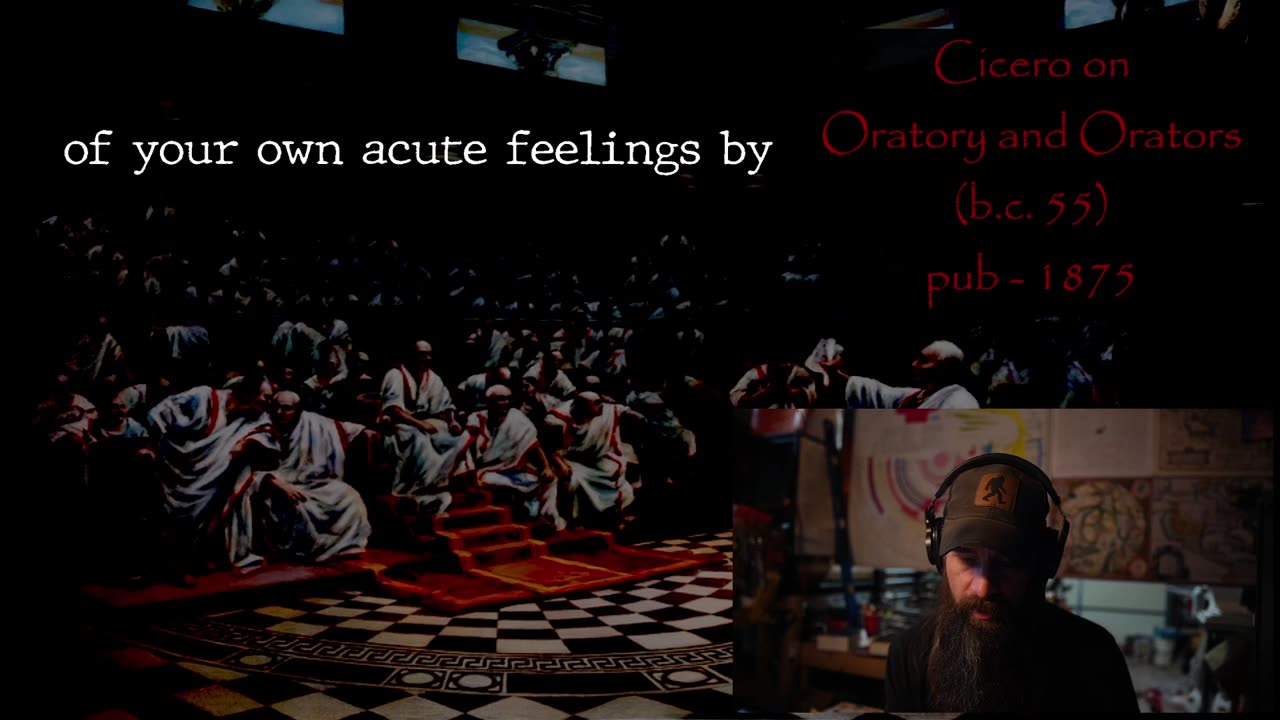Premium Only Content

Cicero on Oratory - B2 - XLV XLVI
Cicero on Oratory - B2 - XLV XLVI
In this video, Cicero discusses the profound connection between an orator's emotions and the emotions they evoke in an audience. He emphasizes that genuine feelings must be present in the orator themselves to effectively sway the judge or audience's sentiments. Cicero reflects on the authenticity of emotions in persuading others and draws parallels between oratory and theatrical performances.
Key Points:
Authenticity in Oratory
Cicero argues that an orator must genuinely feel the emotions they wish to evoke in their audience, as the effectiveness of persuasion relies on this authenticity. He observes that when an orator passionately conveys their feelings, it incites similar emotions in the audience, such as sorrow, anger, or compassion.
Impact of the Orator's Emotions
The transcript explains that an orator's ability to connect emotionally is crucial in persuading judges. If an orator remains detached or fails to display true emotions, it undermines their ability to influence the audience, as they can't inspire feelings like hatred or compassion without demonstrating those emotions themselves.
Relation to Theatrical Performance
Cicero draws a comparison between oratory and acting in theater, noting that even actors must experience real emotion to convincingly portray feelings. This highlights the depth of connection required between the speaker's feelings and the audience's reception, confirming that performance and oratory share a vital emotional core.
Passion in Difficult Cases
Challenging cases stir strong emotions in orators, even when defending strangers. Cicero states that one's integrity and duty towards clients can intensify emotional engagement, strengthening the argument and connecting with the audience on a deeper level, reinforcing the impact of shared emotions.
Nature of Language and Emotion
Cicero illustrates that the nature of language used in rhetoric can evoke strong feelings in both the speaker and the audience. The compelling language not only moves the audience but also reaffirms the orator’s emotional state, reinforcing the necessity for genuine expression.
-
 41:53
41:53
Kimberly Guilfoyle
6 hours agoCharlie's Legacy and Our Mission
42.4K8 -
 1:07:55
1:07:55
vivafrei
5 hours agoJimmy Kimmel Out Indefinitely! Trump "Srubs" Study on Right Wing Violence? Clinton Tweet & MORE
206K80 -
 1:35:02
1:35:02
The Quartering
6 hours agoNuclear Fallout From Jimmy Kimmel Firing, New Head Of TP USA, Obama Whines
231K75 -
 23:35
23:35
Jasmin Laine
4 hours ago“We Were Betrayed”—Carney HUMILIATED As His Base REVOLTS Against Him
40.7K26 -
 LIVE
LIVE
LFA TV
21 hours agoKIMMEL GONE | ANTIFA LABELED TERRORISTS! - THURSDAY 9/18/25
747 watching -
 2:21:28
2:21:28
freecastle
8 hours agoTAKE UP YOUR CROSS- Hope In GOD, and Fear NO Evil!
20.4K9 -
 1:34:10
1:34:10
The HotSeat
5 hours agoChapter 32 Begins: Honoring Charlie Kirk’s Legacy & Jimmy Kimmel Gets Canceled
27.7K9 -
![[Ep 751] Jimmy Kimmel – You’re Fired! | Freedom of Speech is Not Freedom From Consequence](https://1a-1791.com/video/fww1/bd/s8/1/e/-/h/j/e-hjz.0kob-small-Ep-751-Jimmy-Kimmel-Youre-F.jpg) 3:11:10
3:11:10
The Nunn Report - w/ Dan Nunn
5 hours ago[Ep 751] Jimmy Kimmel – You’re Fired! | Freedom of Speech is Not Freedom From Consequence
33.7K7 -
 1:28:39
1:28:39
Sean Unpaved
8 hours agoBills-Dolphins TNF Battle, Steelers' D in Crisis, & Coaching Hot Seat Alert!
50.9K1 -
 59:58
59:58
Human Events Daily with Jack Posobiec
6 hours agoANTIFA - The Domestic Terrorist Organization and the Leftist Who Murdered Charlie Kirk
50.9K39